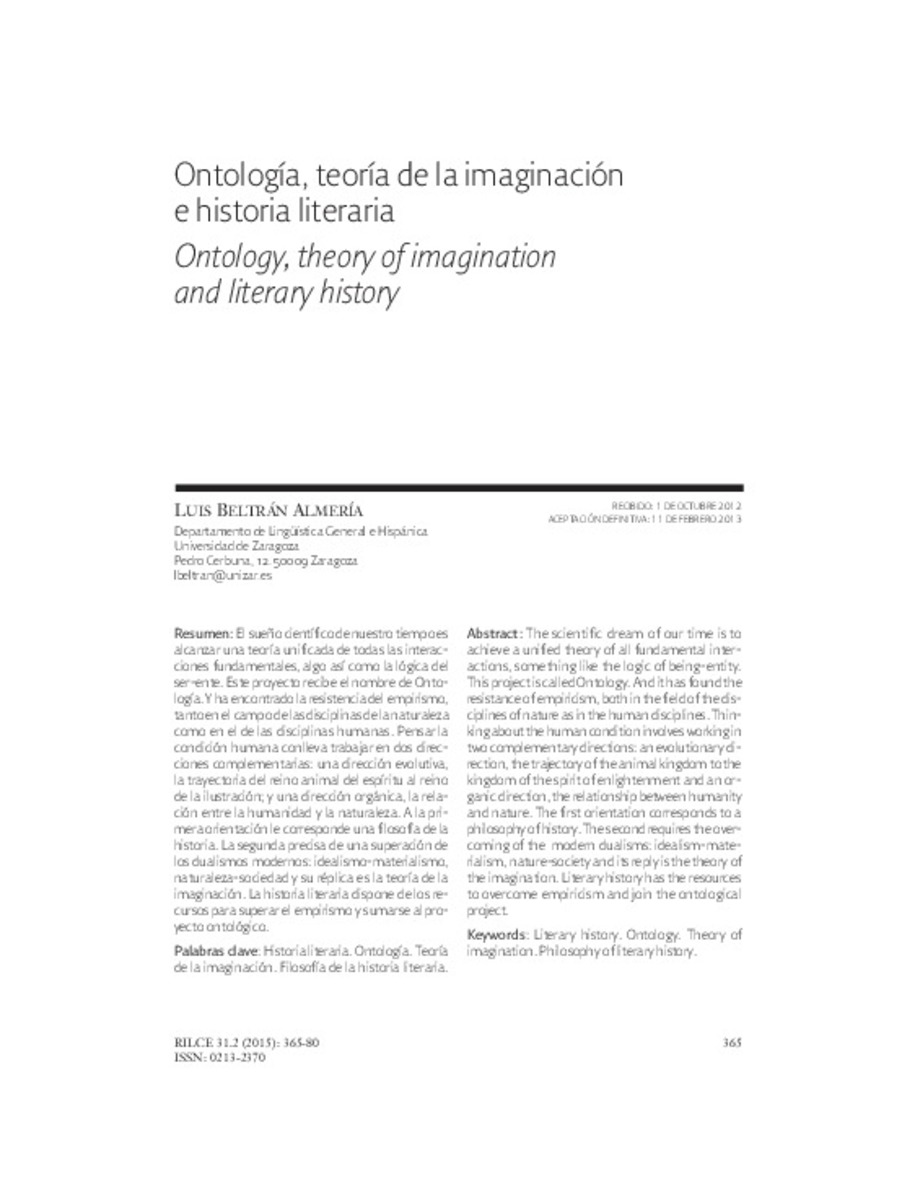Full metadata record
| DC Field | Value | Language |
|---|---|---|
| dc.creator | Beltrán-Almería, L. (Luis) | - |
| dc.date.accessioned | 2016-04-19T09:03:59Z | - |
| dc.date.available | 2016-04-19T09:03:59Z | - |
| dc.date.issued | 2015 | - |
| dc.identifier.citation | Beltrán-Almería, L., ""Ontología, teoría de la imaginación e historia literaria"", RILCE, Servicio de Publicaciones de la Universidad de Navarra, Vol.31.2, (2015), pp. 365-380 | es_ES |
| dc.identifier.issn | 0213-2370 | - |
| dc.identifier.uri | https://hdl.handle.net/10171/40364 | - |
| dc.description.abstract | El sueño científico de nuestro tiempo es alcanzar una teoría unificada de todas las interacciones fundamentales, algo así como la lógica del ser-ente. Este proyecto recibe el nombre de Ontología. Y ha encontrado la resistencia del empirismo, tanto en el campo de las disciplinas de la naturaleza como en el de las disciplinas humanas. Pensar la condición humana conlleva trabajar en dos direcciones complementarias: una dirección evolutiva, la trayectoria del reino animal del espíritu al reino de la ilustración; y una dirección orgánica, la relación entre la humanidad y la naturaleza. A la primera orientación le corresponde una filosofía de la historia. La segunda precisa de una superación de los dualismos modernos: idealismo-materialismo, naturaleza-sociedad y su réplica es la teoría de la imaginación. La historia literaria dispone de los recursos para superar el empirismo y sumarse al proyecto ontológico. | es_ES |
| dc.description.abstract | The scientific dream of our time is to achieve a unified theory of all fundamental interactions, something like the logic of being-entity. This project is called Ontology. And it has found the resistance of empiricism, both in the field of the disciplines of nature as in the human disciplines. Thinking about the human condition involves working in two complementary directions: an evolutionary direction, the trajectory of the animal kingdom to the kingdom of the spirit of enlightenment and an organic direction, the relationship between humanity and nature. The first orientation corresponds to a philosophy of history. The second requires the overcoming of the modern dualisms: idealism-materialism, nature-society and its reply is the theory of the imagination. Literary history has the resources to overcome empiricism and join the ontological project. | es_ES |
| dc.language.iso | spa | es_ES |
| dc.publisher | Servicio de Publicaciones de la Universidad de Navarra | es_ES |
| dc.rights | info:eu-repo/semantics/openAccess | es_ES |
| dc.subject | Materias Investigacion::Filología y Literatura::Filología hispánica | es_ES |
| dc.subject | Historia literaria | es_ES |
| dc.subject | Ontología | es_ES |
| dc.subject | Teoría de la imaginación | es_ES |
| dc.subject | Filosofía de la historia literaria | es_ES |
| dc.subject | Literary history | es_ES |
| dc.subject | Ontology | es_ES |
| dc.subject | Theory of imagination | es_ES |
| dc.subject | Philosophy of literary history | es_ES |
| dc.title | Ontología, teoría de la imaginación e historia literaria | es_ES |
| dc.type | info:eu-repo/semantics/article | es_ES |
| dc.identifier.doi | 10.15581/008.31.1548 | es_ES |
Files in This Item:
Statistics and impact
Items in Dadun are protected by copyright, with all rights reserved, unless otherwise indicated.






